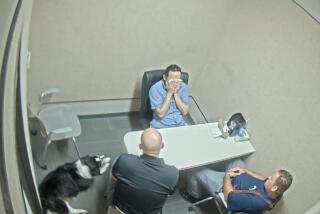Parade of Women Continues at Peyer’s Retrial
- Share via
Prosecutors on Thursday continued to show that former CHP Officer Craig Peyer had a penchant for stopping attractive, young women on an unlighted Interstate 15 off-ramp that is less than a mile from where Cara Knott’s body was found.
In Day Three of Peyer’s retrial on charges that he murdered Knott, 13 women testified that the patrolman ordered them to drive to the foot of the Mercy Road ramp rather than remain on the freeway shoulder within view of passing traffic.
One woman testified that Peyer took her on a five-minute tour of the desolate Mercy Road area in his patrol car, while two witnesses said they expected Peyer would ask them on dates because he acted romantically interested in them.
Some said the stops made them uneasy. A new witness, Patrice Diaz, said she was “fearing for my life” when she was ordered to drive down the off-ramp, and that she could not believe a law enforcement officer would confront a motorist in such a dark location.
“I didn’t roll down my window because I was scared for my life,” said Diaz, visibly upset on the witness stand. “I didn’t think he was working for the law.”
At one point, Diaz said, Peyer climbed into her car and operated the emergency brake to test her brake lights. She said she became so unnerved that she finally locked her car and drove off suddenly after telling Peyer he was “unprofessional” and that she planned to report him to his superiors.
At one point Thursday, defense attorney Robert Grimes attempted to halt the long line of women parading into the courtroom to tell their stories of being stopped by Peyer. Grimes said that “whatever point the prosecution is attempting to make with this line of testimony has been made” and argued that continuing would be “cumulative and prejudicial.”
Superior Court Judge Richard Huffman agreed that “there comes a point where this could become prejudicial” and urged Deputy Dist. Atty. Paul Pfingst to “wrap up” his use of such witnesses.
Peyer, 38, was on patrol along Interstate 15 the night of Dec. 27, 1986, when Knott disappeared while on her way from her boyfriend’s house to her home in El Cajon. Prosecutors allege that he pulled Knott over at the Mercy Road off-ramp, strangled her and threw her body from an abandoned bridge near the freeway exit. Knott’s body was found in a creekbed 65 feet below the bridge; her Volkswagen beetle was found parked nearby, the keys in the ignition and the driver’s window partly rolled down.
In February, jurors in Peyer’s first trial deadlocked, 7 to 5, for conviction. His retrial is expected to last two months.
Several themes have emerged in the two days of testimony from the 24 women who said they were stopped by Peyer and had lengthy conversations with him about their personal lives.
Some of the women said they were followed for a few miles by Peyer before being ordered to pull off at Mercy Road, and many testified that they attempted to stop on the shoulder and partway down the exit but were ordered to continue to the foot of the ramp.
Four said they had already passed the Mercy Road exit when stopped by Peyer and were forced to back up against freeway traffic to negotiate the off-ramp as he directed. Many were never asked to show their driver’s license or registration and were not issued citations.
Unusual Location
Like Knott, seven drove Volkswagen beetles. Two women were stopped twice by Peyer and two said they complained to the CHP about the unusual location and nature of the stops.
Susan Termine was one of two women who said she felt Peyer’s interest was more than professional.
“It appeared to be a come-on situation,” Termine said of her 50-minute encounter with Peyer on May 22, 1986.
“I felt like there was a possibility I might be asked out,” said Cheryl Johnson, a nurse whose June, 1986, stop lasted 1 hour and 50 minutes. “I felt like that’s why the conversation was prolonged, that he was waiting for the right time to say something.”
Johnson also said Peyer remarked to her about the darkness of the Mercy Road area and said that “someone could be raped or murdered here.”
None of the women said that Peyer attempted to prevent them from leaving when they wished to. None has said that Peyer touched her or made sexual advances.
Grimes frequently attempted to suggest that some of the women may have embellished their testimony since they first talked with authorities about the stops immediately after Peyer’s arrest. In his opening statement, Grimes indicated that some witnesses have been influenced by publicity, and on Thursday he attempted to highlight inconsistencies in the women’s accounts.
Also Thursday, prosecutors presented testimony from several men in an effort to show that Peyer had a different style with male motorists.
Three men testified that they were pulled over on the shoulder of I-15 near Mercy Road and given citations during routine encounters that lasted 3 to 10 minutes. They said their conversations with Peyer were strictly professional.
Two other men--both of whom had shoulder-length blond hair at the time of their stops--said they were ordered down Mercy Road but detained only briefly after receiving tickets. One, John Jones, said Peyer gave him “a surprised blank stare” when he came up to the window and shined a flashlight on his face.
Thursday evening, jurors visited the Mercy Road off-ramp and examined the area where Knott’s body was discovered.
More to Read
Sign up for Essential California
The most important California stories and recommendations in your inbox every morning.
You may occasionally receive promotional content from the Los Angeles Times.













